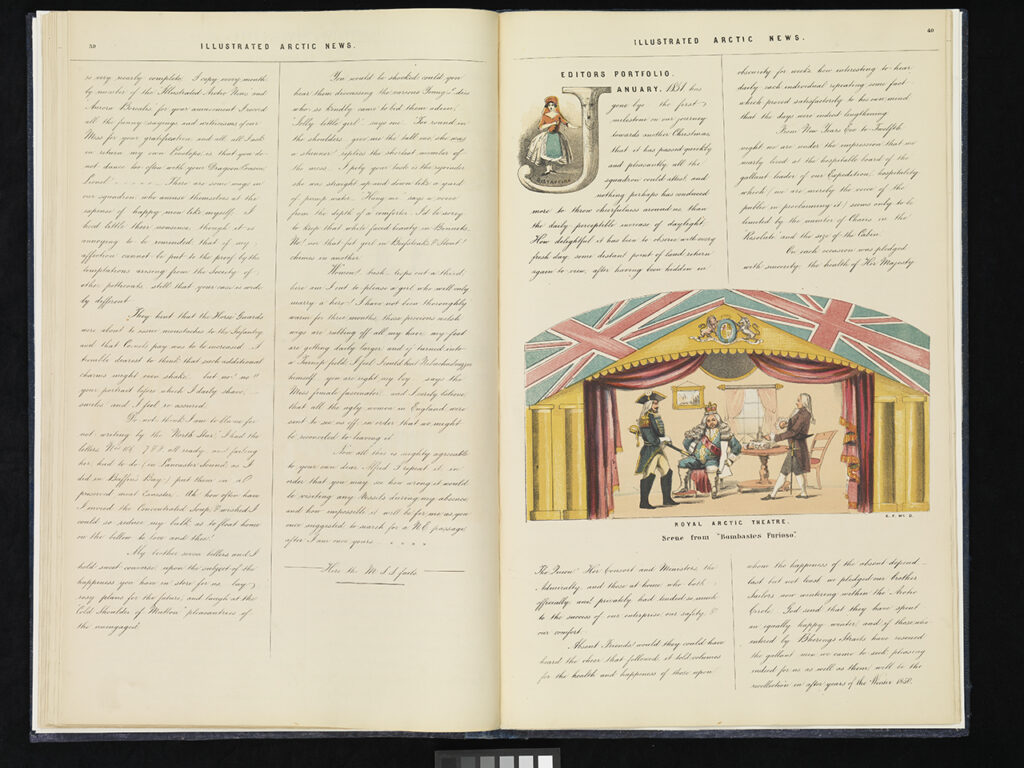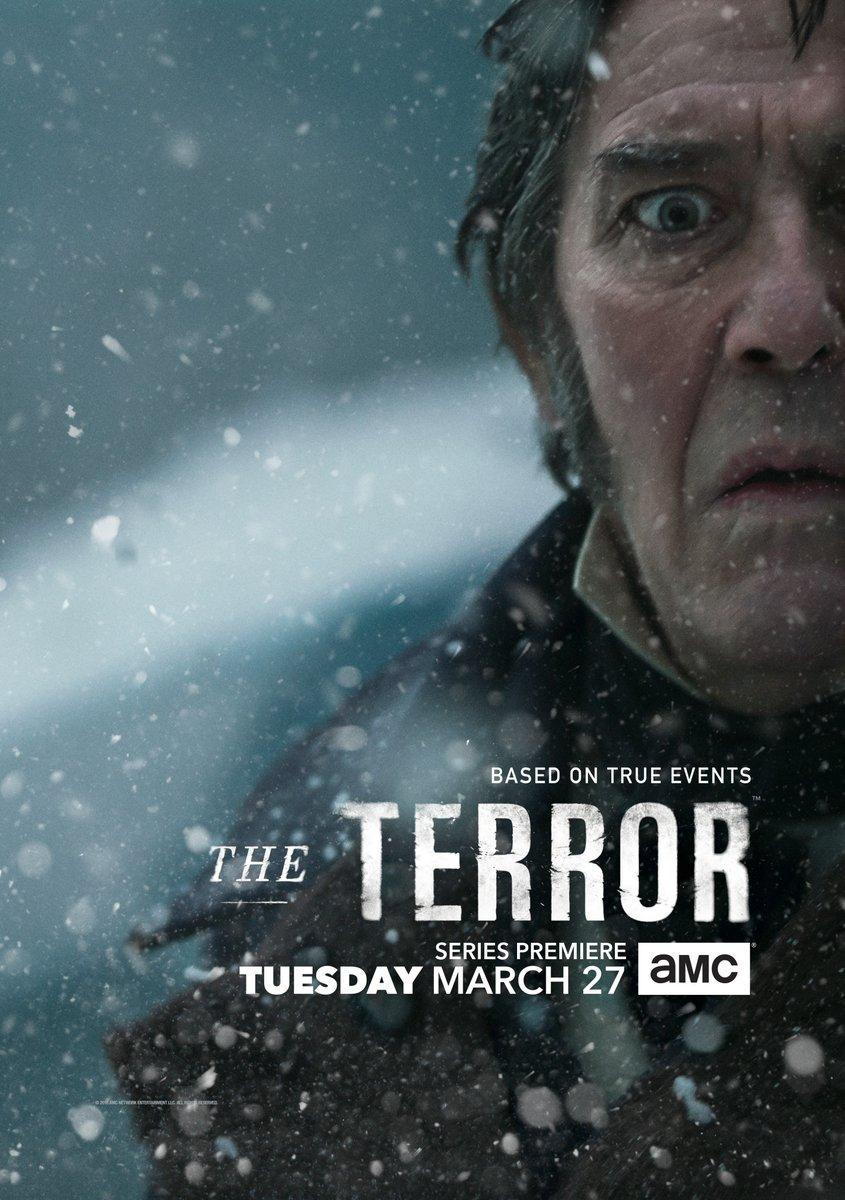[Note: this is an example of a post that is not yet fully revised. I drafted, then added new things, but didn’t totally finish everything up (yet).]
I’m going to start with a little story so you can fully understand how I came to find the show I’m going to tell you about. In graduate school, I became obsessed with maritime literature and history. It started because I was really interested in the practice of amateur theatricals in the Victorian period (these performances, sometimes called “parlor theatricals,” provide key moments in many of the novels I was reading, and I wanted to know what they were actually like in reality). In a course on Herman Melville, I discovered that sailors in the nineteenth century also enjoyed putting on their favorite plays aboard ships during their many months at sea. This led me on trips to various archives, where I found many fascinating artifacts of these shipboard performances. One of those artifacts was a handwritten shipboard newspaper called The Illustrated Arctic News, which was produced in 1850 aboard one of the ships hunting for the lost Franklin expedition, years after it had left from England in search of The Northwest Passage. The newspaper was fascinating to me because there were detailed reviews of the plays performed aboard the ships as they were trapped in the ice over the winter.

How did The Terror Find Me?
Despite my obsession with maritime literature and culture, I heard nothing about The Terror, a show that premiered on AMC in 2018 and offered a story about what life was like for the officers and sailors of the Franklin expedition as they got trapped in the ice and died of disease, violence, and starvation. So, how did I learn about this incredible show that was already wildly popular and totally relevant to my interests? Through an e-mail to an academic listserv. This summer, a colleague sent an e-mail to the C-19 listserv, encouraging scholars in the field to consider submitting a paper to a conference that was created by fans of the show. The conference is called TerrorCamp, and I imagine it will be a blend of a literature conference and a Comic-Con event (I’ve proposed a presentation so I might be able to tell you all about it in December!).
Here’s what Hester posted:
Hi all,
The following CFP may at first seem far afield to C19 interests, but I encourage you to take a look if you are into environmental humanities and/or having your academic conferencing mind blown. I attended last year’s Terror Camp and the event was electrifying and transformative. It made academia feel new, and made different intellectual futures seem possible. (This great article on the conference gives a glimpse of what I mean: https://www.atlasobscura.com/articles/the-terror-amc-camp-fandom). Outside of C19 it’s the best conference I’ve ever attended and I hope some of you will be interested.
yours,
Hester
I wanted to watch the show instantly, but I was frustrated to find it wasn’t available on any of the channels I subscribe to. So, I went on Amazon and BOUGHT THE DVD. I haven’t done that in many years, but it seemed to be the same cost and then I’d have it forever (I was sure I’d be re-watching it). When it came in the mail, I got the DVD player out of the drawer where it had been living since we moved three years ago, and hooked it up to the TV. I then had to search the house to find the remote for the DVD player, which was inside a box in a chest that my husband thought he remembered having random remotes. It was pretty frustrating. I had the DVD in my hand, but couldn’t get at The Terror!!
I overcame these challenges and watched a few episodes via DVD (navigating the totally not-intuitive interface of the DVD player to turn on the closed captions because I definitely couldn’t understand what anyone was saying). And then, my husband said at breakfast one day, “Oh, guess what’s coming to Netflix?”
The Terror.
I watched the rest of it on Netflix. It was just easier. Also, now it’s in my viewing history so maybe they show me some other cool things related to interests they didn’t know I had.
My point in sharing this story is that this new thing that I watched found me. I finished my dissertation and published a few articles on shipboard performance, but mostly thought it was an EXTREMELY niche interest that the rest of the world (even the world of literature and theater historians) didn’t really care about. I had filed it away and wasn’t actively looking for films and shows that represented the sea. But then Hester’s e-mail to the listserv found me and I went hunting for a way to watch it.
My Experiences During The Terror (and the features prompting them and the techniques used to create those features)
Confusion
I’ll flesh this out in my revised draft, but the first emotion I felt was confusion because I didn’t know what was going on and I could understand what anyone was saying. The show opens with a scene that isn’t explained in any way, and I just sort of settled into the feeling of confusion (part of it was intentional, I think), but I did turn on the subtitles so I could at least figure out what the characters were saying.
I think this is a technique of narration. The story has a particular timeline, but we experience a scene that happens after it is all over and then we’re transported to the beginning of the expedition, and then get flashbacks from time to time (or insight into what’s happening back in England as people are starting to worry because the expedition hasn’t returned). Another feature of narration is the choice to have the characters speak fast and make it challenging to follow everything that’s happening. The technique that causes this feeling of confusion is that everything is not explained to you. You get a part of the story, but not all of the pieces. And this confusion actually prompted me to feel curious. I need to mention that. It didn’t make me quit. It made me keep going so I could understand.
Paranoia
There are some characters in this show that I can’t figure out. There’s something just a little off-putting and I can’t figure out what they are or what they’re doing. This makes me feel on guard–always considering in my mind another way of interpreting their behavior. There is a story, but I feel like there’s an author making a point through his telling of this story.
Lady Silence Early in the season, the ships get stuck in the ice and one of the groups sent out to find leads accidentally kills a Netsilik man (mistaking him for a bear). His daughter comes aboard the ship with him as they try to treat his wounds, but he winds up dying. She speaks at first to a few officers who have learned her language in previous voyages to the region, but eventually cuts out her tongue as she assumes the shaman role her father once held. Her interaction with other characters is fascinating and I am still trying to figure out what she thinks about these ridiculous British people who shouldn’t be where they are.
The Creature At first, the crew thinks men are being killed by a polar bear. But then when they set up a blind to trap the bear, it ambushes them and drags the captain’s body into the spot where the shaman’s body was unceremoniously buried–a very deliberate move that makes it clear that it’s not just a bear. I’ve spent the entire show trying to figure out how I’m supposed to interpret the creature (is it supernatural or an illusion created by the Netsilik people?)
I think the technique in all of these cases is allegory, but it’s not the way allegory typically works. There are plenty of stories in which characters are meant to represent something and things are fairly straightforward. This is allegory where I don’t trust my interpretation of what things are supposed to mean. I think the creators of this show are messing with me and I’m constantly trying not to be duped.
Empathy
There is a depiction of alcoholism in the show that makes it easier to understand the perspective of someone who suffers with addiction. There are lots of little narrative techniques that work together to make this effect. It starts with establishing that his behavior is shameful to him and his fellow officers (we see them talking about him when he’s not around).
But then he decides to get sober and the man who cares for him as he goes through withdrawal (Jopson, the Captain’s steward) shares a story with him about his mother’s addiction to laudanum. And the captain shares his own story. I thought the scene provided a really powerful explanation of the hard-to-articulate existential anguish that prompts people to numb themselves with substances (and we see that he comes out of it). We see this character apologize, and so we can feel empathy for him and forgive him. The technique is that apology
Okay, I’m leaving the paragraph above because it’s what I wrote from my recollection of the show. I’m sort of startled by how different I think this works now that I’ve looked carefully at the actual scene. And it wasn’t easy to do. I thought I could find a clip, but no one has thought that particular scene was worth pirating for YouTube (yet), so I had to do it. I first tried to just do a screen recording, but of course Netflix has something set up to interfere with that working. So I did what every bootlegger in a movie theater does…I used my phone. And the recording is terrible. And…it’s also too big to upload to this site (it’s only a little over three minutes!). I looked around for the script so I wouldn’t have to transcribe everything and found this site. I used the text there to turn it into the dialogue I’m quoting below, and I’m adding in the way the characters acted to sort of show what I noticed in the scene.
Crozier: Why are you doing that?
Jopson: Dr. MacDonald will be here soon.
Crozier: Dr. MacDonald won’t mind if I have hair astray.
Jopson: Turmoil on the inside needn’t show on the out, sir.
Crozier: You forget, I’ve gotten turmoil all over you, and the bed, in the last hour alone.
Just let me lie in it.
It will teach me.
Jopson: It is you, sir, who is teaching the rest of us.
Crozier: Jopson yours is the only company that I don’t completely hate right now.
Now, don’t push it.
Jopson: How do you feel?
Crozier: Like Christ, but with more nails.
Jopson: Sir.
Here.
Only sips, sir.
Crozier: More.
Jopson: No.
The doctor is the captain in this matter, sir.
Full stop.
Crozier: You’ve done this before.
Who was it? [Jopson acts like he doesn’t want to answer the question] Every word I say hurts.
Don’t get mysterious, Jopson.
Jopson: It was my mother, sir.
Crozier: Your mother?
Yeah.
She She took my brother to a circus in Marylebone.
The crowd was seated up on risers.
You know how they pack them in to sell more seats.
My brother dropped his shoe beneath him.
But they were low enough that my mother could reach and get it.
And that’s when the whole contraption collapsed.
Her hand was smashed.
She kept it, but it was too maimed to ever use again.
And the only thing that would take away the pain was laudanum.
Crozier: You were a boy?
Jopson: No.
No, this was just before we set sail to the Antarctic in ’39.
She wanted me to go.
She didn’t want me to miss the opportunity.
But she was a different woman by the time we got back.
Pardon me, sir. [Jopson trying to change the subject and stop the story]
Crozier: No, go on.
Well, the problem was it made her happy.
She would stop breathing in the night.
She would soil herself.
She would get mesmerized to the point where she would forget to feed my brother or herself for days.
But it took away her pain and it made her laugh.
I don’t like to hear a woman laughing now, sir.
Our neighbor was a nursemaid from the workhouse, and she helped me taper mother off it for three weeks.
Crozier: How did she fair when she was through it?
Another officer: Hello.
Shooting the cuff, eh, sir? You look ready to dance a polonaise.
Crozier: Thomas.
Jopson: I got you, Captain.
You can count on that, sir.
What I actually think I love about this scene is that Jopson is basically pointing out that it was a horrible accident that created the pain that prompted his mother to become addicted to laudanum. I don’t know why I felt like Crozier offered an explanation for his own addiction. He doesn’t say anything. He just listens (slightly terrified) and wants to know if Jopson’s mother came out of it. They’re interrupted before Jopson can really answer. Instead, Jopson says, “I got you, Captain” (insinuating that his mother wasn’t better after detox–and we can only imagine since the pain in her hand would be back). Crozier does essentially take responsibility for his behavior in a previous scene when he decides to get sober and tells all of the officers that he will need their support as he tries to detox (he says they are not to give in when he begs for whiskey). But this was the scene that was more powerful to me, and I think it’s because of the way it frames addiction. Jopson’s perspective on his mother’s addiction offers a new way of thinking about Crozier’s addiction.
Tallying up Experiences, Features, and Techniques
| Experience | Feature (very brief desc.) | Technique |
| Curiosity (after confusion) | Very dark, hard to understand at first | Colloquial language and minimal lighting (realism) |
| Paranoia | Allegorical characters who are hard to interpret | Vigilance Trigger |
| Empathy | Crozier’s Alcoholism | Apology + Hamartia |
Could I Help The Terror Find Its Ideal Audience?
I’d love to see more people find The Terror, whether they’re interested in maritime history or if they know nothing about the period or topic, but appreciate the experiences it provides. People who like horror will like this–particularly psychological horror. I looked at the show on Netflix to see if I could find what features it is using to recommend the show and found this

From this, I can tell that it’s in a genre called “Period Pieces,” but Netflix could really specify the particular period it’s in. It gives the adjectives “scary, gritty, suspenseful.” I mentioned the suspense so that’s working, but what about the other things? I think gritty means that it shows unpleasant aspects of reality and that’s accurate. People who don’t like to see dirty men eating rotten food probably know to stay away from “gritty” things. But there are some things that could be added.
There’s another interesting place where features of films get curated by the general public. It’s always hard for me to find, but if you look up a film on IMDB and scroll around, you’ll eventually find “plot keywords.” These plot keywords give you a sense of features that might lead you to other shows with the same features. Here’s The IMDB Plot Keywords for The Terror. I could see these being useful (but do people really just seek out movies in which people cut their tongues out?). I actually think the best way to recommend The Terror is to recommend it to people who are looking for the following things:
empathy-inducing depiction of alcoholism
paranoia-inducing allegorical characters
curiosity-inducing portrayal of a fascinating moment in history
Outside of a class like this, where a professor helps you understand the experiences you enjoy and find more creative works that might do the same thing, I’m not sure how people would know to even look for these things–I’m still thinking through this.
Works Cited
Going to do this later. It is late.




6 Comments
Add Yours →I found some of the characters you had described in the book interesting. The Creature in particular was the most interesting, have you seen it in the show yet or have you not gotten that far yet. I know the name probably tells what genre it is but is it horror themed at all? It’s just by the description of the creature and how it intentionally buried the captains body where the shaman’s body is makes me wonder how intelligent this creature is. Also the girl seemed a little peculiar to me, she cuts off her tongue but then what? How do the rest of the cast react to this and how do they go about interacting with her from there. Last thing I’m interested in about the show would be how the show itself takes place after the events of what happened in the past happened. How do they avoid spoilers by doing this? Do you know whether or not certain characters will survive certain situations or not or is the story being told by a different person who gathered all the information from the surviving crew?
I would like to talk about the Creature Character you talked about, it seems like the creature was smart and knew how to outplay it’s prey. I love these type of characters in horror text/movies because it adds suspense and makes the monster more scary. I noticed you said you didn’t know if the creature was supernatural or an illusion created by the Netsilik people, did you ever figure out what it was?
I liked your explanation of the confusion you felt when watching this show. Even when you’re not fully able to understand what is going on, there is something very captivating about the show that makes you want to keep watching. The confusion that is portrayed, if it is fairly well-written, could be a technique that is meant to leave the interpretation of the characters and story up to the watcher. I also like how from your explanation, it seems that the show kind of tells a story through the characters. As the show progresses, you start to learn more and more about the characters and then maybe things start to fall into place. If this is the case, then I feel this is a great showing of good character and story writing.
I like that you recognize that although allegory is at play here, it’s not how it is typically perceived. As you put it, this type of allegory makes you go against your own interpretation of meanings. I think recognizing that as a viewer is key to keeping an audience captivated and craving more, as they come to realize that there’s answers they so desire and that they’ll get it if they keep watching!
I really like how you described how you found The Terror, and how it took a while to actually watch it. I liked how you struggled with finding the dvd remote because i also always lose my remotes. I also liked how you talked about the genres The Terror is listed under, as I sort-of have trouble placing genres with pieces of media, so it’s interesting to hear what a piece of media is actually considered.
I really liked how you used the characters as I feel it helped add to the story. I also liked how you added the DVD, I think this added a great sense of how much you wanted to watch this, and the lengths you took to do so. With you adding the part with the other recommended shows, Did you happen to take a look at the other shows yo see if you would find an interest in them?